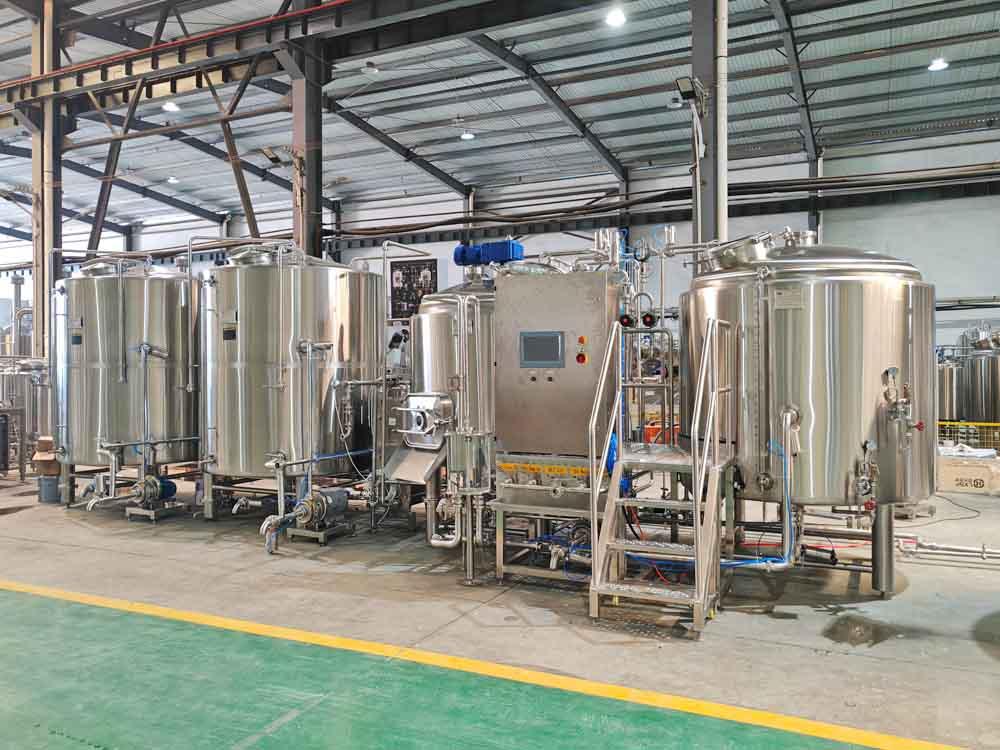What are the requirements for malt grinding degree-beer equipment use?
- May 13, 2023
- 161
- tiantai
In a complete beer brewing system, Malt miller is also a necessary part to prepare crushed malt for brewing.
Whether malt is crushed well or not will also affect the brewing result. A moderate malt grinding degree is important
The degree of malt grinding refers to the proportion of coarse grain and fine grain after the malt is crushed. It also means the percentage of husk or the degree to which the husk is broken. According to the characteristics of beer brewing, the degree of crushing is not the finer the better, but coarse and fine extent is moderate, depending on the specific requirements of the malt quality and the specific conditions of the mashing process.
The crushing degree requirement for malt is that the wheat husk must be broken but not broken, which is beneficial to the filtration of wort for the lauter tank. In the case of ensuring that the shell is broken but not very broken, the finer the crushing inside, the better, which is more conducive to Enzyme action, leaching more carbohydrates.
In order to ensure the mashing leaching rate, the crushing of auxiliary materials is generally finer, but it should not be too fine. Because too fine powder, especially in the case of poor mashing effect and incomplete conversion, will easily become sludge and block the channel of wort filtration or enter the wort through the spent grain layer, so that there are more suspended particles in the wort. If the enzyme activity of the malt is high, the grinding degree of the auxiliary material should be controlled to reach more than 70% of the fine powder (granule) passing through a 40-mesh sieve. In this case, it can basically obtain a satisfied effect can be obtained.

It should be noted that finer crushing is theoretically beneficial. Because the ratio of surface area to volume (specific surface area) of fine particles is larger, it is beneficial to the gelatinization of starch granules and the action of enzymes. But no matter what kind of miller, it is impossible to pulverize all the raw materials to a very fine level during the grinding process. In addition, too fine particles stick together, and it is more difficult for water to enter the gap of particles, which also reduces the surface area of the particles accordingly, so the crushing of raw materials does not need to be too fine.
How do you grind malt usually? Welcome to leave message for discuss further.
Besides, welcome to contact us to customize beer brewery equipment. We will also share some beer recipe and use tips. Cheers!
Nicole | Sales manager
Email: [email protected]
Whether malt is crushed well or not will also affect the brewing result. A moderate malt grinding degree is important
The degree of malt grinding refers to the proportion of coarse grain and fine grain after the malt is crushed. It also means the percentage of husk or the degree to which the husk is broken. According to the characteristics of beer brewing, the degree of crushing is not the finer the better, but coarse and fine extent is moderate, depending on the specific requirements of the malt quality and the specific conditions of the mashing process.
The crushing degree requirement for malt is that the wheat husk must be broken but not broken, which is beneficial to the filtration of wort for the lauter tank. In the case of ensuring that the shell is broken but not very broken, the finer the crushing inside, the better, which is more conducive to Enzyme action, leaching more carbohydrates.
In order to ensure the mashing leaching rate, the crushing of auxiliary materials is generally finer, but it should not be too fine. Because too fine powder, especially in the case of poor mashing effect and incomplete conversion, will easily become sludge and block the channel of wort filtration or enter the wort through the spent grain layer, so that there are more suspended particles in the wort. If the enzyme activity of the malt is high, the grinding degree of the auxiliary material should be controlled to reach more than 70% of the fine powder (granule) passing through a 40-mesh sieve. In this case, it can basically obtain a satisfied effect can be obtained.

It should be noted that finer crushing is theoretically beneficial. Because the ratio of surface area to volume (specific surface area) of fine particles is larger, it is beneficial to the gelatinization of starch granules and the action of enzymes. But no matter what kind of miller, it is impossible to pulverize all the raw materials to a very fine level during the grinding process. In addition, too fine particles stick together, and it is more difficult for water to enter the gap of particles, which also reduces the surface area of the particles accordingly, so the crushing of raw materials does not need to be too fine.
How do you grind malt usually? Welcome to leave message for discuss further.
Besides, welcome to contact us to customize beer brewery equipment. We will also share some beer recipe and use tips. Cheers!
Nicole | Sales manager
Email: [email protected]




